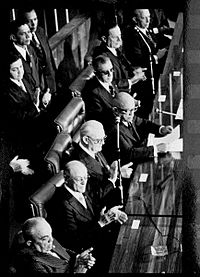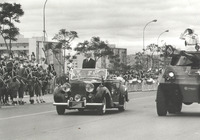Ernesto Geisel facts for kids
Quick facts for kids
Ernesto Geisel
|
|
|---|---|
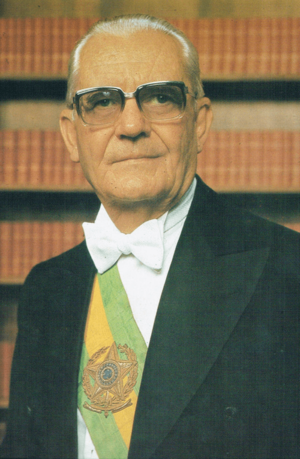
Official portrait, c. 1974
|
|
| President of Brazil | |
| In office 15 March 1974 – 15 March 1979 |
|
| Vice President | Adalberto Pereira dos Santos |
| Preceded by | Emílio Garrastazu Médici |
| Succeeded by | João Figueiredo |
| Chair of Petrobras | |
| In office 6 November 1969 – 6 July 1973 |
|
| Nominated by | Emílio Garrastazu Médici |
| Preceded by | Waldemar Cardoso |
| Succeeded by | Faria Lima |
| Justice of the Superior Military Court | |
| In office 20 March 1967 – 27 October 1969 |
|
| Nominated by | Castelo Branco |
| Preceded by | Floriano de Lima Brayner |
| Succeeded by | Jurandyr de Bizarria Mamede |
| Chief Minister of the Military Cabinet | |
| In office 15 April 1964 – 15 March 1967 |
|
| President | Castelo Branco |
| Preceded by | André Fernandes de Sousa |
| Succeeded by | Jaime Portela de Melo |
| In office 25 August 1961 – 8 September 1961 |
|
| President | Ranieri Mazzilli (interim) |
| Preceded by | Pedro Geraldo de Almeida |
| Succeeded by | Amaury Kruel |
| Personal details | |
| Born |
Ernesto Beckmann Geisel
August 3, 1907 Bento Gonçalves, Rio Grande do Sul, Brazil |
| Died | 12 September 1996 (aged 89) Rio de Janeiro, Brazil |
| Resting place | São João Batista Cemetery |
| Political party | ARENA (1974–1979) |
| Spouse |
Lucy Markus
(m. 1939) |
| Children | Amália Orlando |
| Alma mater | Military School of Realengo Officers Improvement School Army General Staff School |
| Signature | |
| Military service | |
| Allegiance | |
| Branch/service | |
| Years of service | 1927–1969 |
| Rank | General of the army |
| Commands |
|
| Battles/wars |
|
Ernesto Beckmann Geisel was a Brazilian Army officer and politician. He served as the President of Brazil from 1974 to 1979. This was during a time when Brazil was led by a military government.
Contents
Early Life and Family Background
Ernesto Geisel was born in Bento Gonçalves, a city in the state of Rio Grande do Sul. His father, Guilherme Augusto Geisel, was a German teacher. He moved to Brazil in 1883 when he was 16 years old. Ernesto's mother, Lydia Beckmann, was born in Brazil to German parents.
In Bento Gonçalves, most people were Italian immigrants. Ernesto grew up seeing the differences between his strict German family and the more relaxed Italian families. His family was Lutheran, and his grandfather was a priest.
At home, Ernesto spoke both German and Portuguese. His father wanted his children to speak Portuguese without a foreign accent. As an adult, Ernesto could understand German but found it hard to write or speak fluently.
In 1940, Geisel married Lucy Markus. She was the daughter of an army colonel. They had a daughter named Amália Lucy and a son named Orlando. Sadly, Orlando died in a train accident in 1957. Geisel's wife, Lucy, also died in a car accident in 2000.
Military Career and Rise to Power
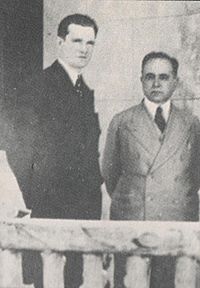
Ernesto Geisel and his brother Orlando joined the army in 1921. In 1925, Ernesto was the top student when he graduated from the Military High School in Porto Alegre. He continued his military education at the Military School of Realengo. He graduated first in his class in 1928 and became an artillery officer. He was promoted to lieutenant in 1930.
Geisel saw many important events in Brazilian history. These included the Revolution of 1930 and the Getúlio Vargas dictatorship. He also saw the end of that dictatorship in 1945. From 1946 to 1947, he worked as a military representative in Uruguay.
In 1960, he became a brigadier-general. Geisel was involved in the 1964 Brazilian coup d'état. This military takeover removed the president, João Goulart. After the coup, Geisel became the Chief of the Military Staff for President Humberto de Alencar Castelo Branco. He held this important position from 1964 to 1967.
He was promoted to Lieutenant-General in 1964. In 1966, he reached the highest rank: 4-star General. In 1969, he became the president of Petrobras, Brazil's state-owned oil company.
Presidency (1974–1979)
In 1973, the president at the time, Emílio Garrastazu Médici, chose Geisel to be the next president. There was a lot of discussion behind the scenes. Some military leaders were against Geisel, while others supported him. Geisel was helped by his older brother, Orlando Geisel, who was the Minister of Army. His close friend, General João Figueiredo, was also a key supporter.
During this period, Brazil's president was chosen by the military. Then, the choice was approved by the Congress. This made it seem like a democracy. However, the pro-military party, ARENA, had many members in Congress. This meant the military's choice always won.
For the first time under military rule, an opposition candidate ran. This was Ulysses Guimarães from the MDB party. He knew Geisel would win, so he ran an "anticandidacy." As expected, Geisel was elected by a large majority. He became president on March 15, 1974, for a five-year term.
Economic Challenges and Growth
From 1968 to 1973, Brazil's economy grew very fast. This period was called the "Brazilian Miracle." However, in 1974, the world faced an oil crisis. This slowed Brazil's economic growth. Brazil had to import a lot of its oil. This caused the country's foreign debt to increase.
President Geisel wanted to keep the economy growing. He also had to deal with the effects of the 1973 oil crisis. He invested a lot of money in big projects. These included highways, phone systems, hydroelectric dams, and factories. He also focused on getting minerals and atomic energy. To get more oil, he allowed foreign companies to search for oil in Brazil. This was the first time this had happened since the 1950s.
Gradual Return to Democracy
Geisel took a more relaxed approach to political opposition. He and his Chief of Staff, Minister Golbery do Couto e Silva, planned a slow return to democracy. This plan was called abertura and distensão. It meant a gradual easing of military rule. Geisel said it would be "the maximum of development possible with the minimum of indispensable security."
In the 1974 elections, the opposition party gained more votes. However, some people were still being treated badly by the government. In 1977 and 1978, the question of who would be the next president caused more tension. Geisel tried to weaken the opposition party (MDB). He allowed other opposition parties to run. This would split the votes against the government. In October 1977, he removed a far-right Minister of Army, General Sylvio Couto Coelho da Frota. This general had tried to become a candidate for president.
In 1978, Brazil saw its first labor strikes since 1964. The opposition MDB party also won more elections. In late 1978, Geisel announced important changes. He ended the strict Institutional Act 5. This act had given the president special powers. He allowed people who had been forced to leave Brazil to return. He also brought back habeas corpus and full political rights. He planned for General João Figueiredo to be his successor.
Foreign Policy Changes
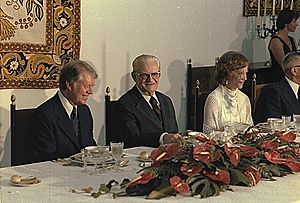
During his five years as president, Geisel changed Brazil's foreign policy. He became more practical. Even though he was conservative and strongly against communism, he made friendly moves towards communist countries. Brazil started diplomatic relations with the People's Republic of China. It also connected with socialist governments in Angola and Mozambique. This showed that Brazil was becoming less dependent on the United States.
Brazil changed its foreign policy to help its economy. This new approach was called "responsible pragmatism." It replaced the old way of always siding with the United States. Brazil relied on imported oil for 80% of its needs. So, Geisel changed Brazil's stance on Middle Eastern issues. Brazil became more neutral instead of strongly supporting Israel. Brazil also grew closer to countries in Latin America, Europe, and Japan.
In 1975, Brazil made an agreement with West Germany to build nuclear reactors. This caused problems with the U.S. government under President Carter. The Carter administration also criticized Geisel's government for human rights issues. Geisel felt that the Carter administration was being too bossy and didn't understand Brazil. In April 1977, he ended Brazil's military alliance with the United States.
Honours and Awards
Geisel received many important awards from other countries:
 Grand Cross of the National Order of the Legion of Honour (France, 1976)
Grand Cross of the National Order of the Legion of Honour (France, 1976) Honorary Knight Grand Cross of The Most Honourable Order of the Bath (United Kingdom, 1976)
Honorary Knight Grand Cross of The Most Honourable Order of the Bath (United Kingdom, 1976) Collar of the Supreme Order of the Chrysanthemum (Japan, 1976)
Collar of the Supreme Order of the Chrysanthemum (Japan, 1976) Grand Collar of the Military Order of Saint James of the Sword (Portugal, 1977)
Grand Collar of the Military Order of Saint James of the Sword (Portugal, 1977) Grand Collar of the Order of Prince Henry (Portugal, 1979)
Grand Collar of the Order of Prince Henry (Portugal, 1979)
See also
 In Spanish: Ernesto Geisel para niños
In Spanish: Ernesto Geisel para niños
- Brazilian military government
- Nuclear activities in Brazil
- History of ethanol fuel in Brazil
- 1974 Brazilian legislative election
- 1978 Brazilian legislative election


